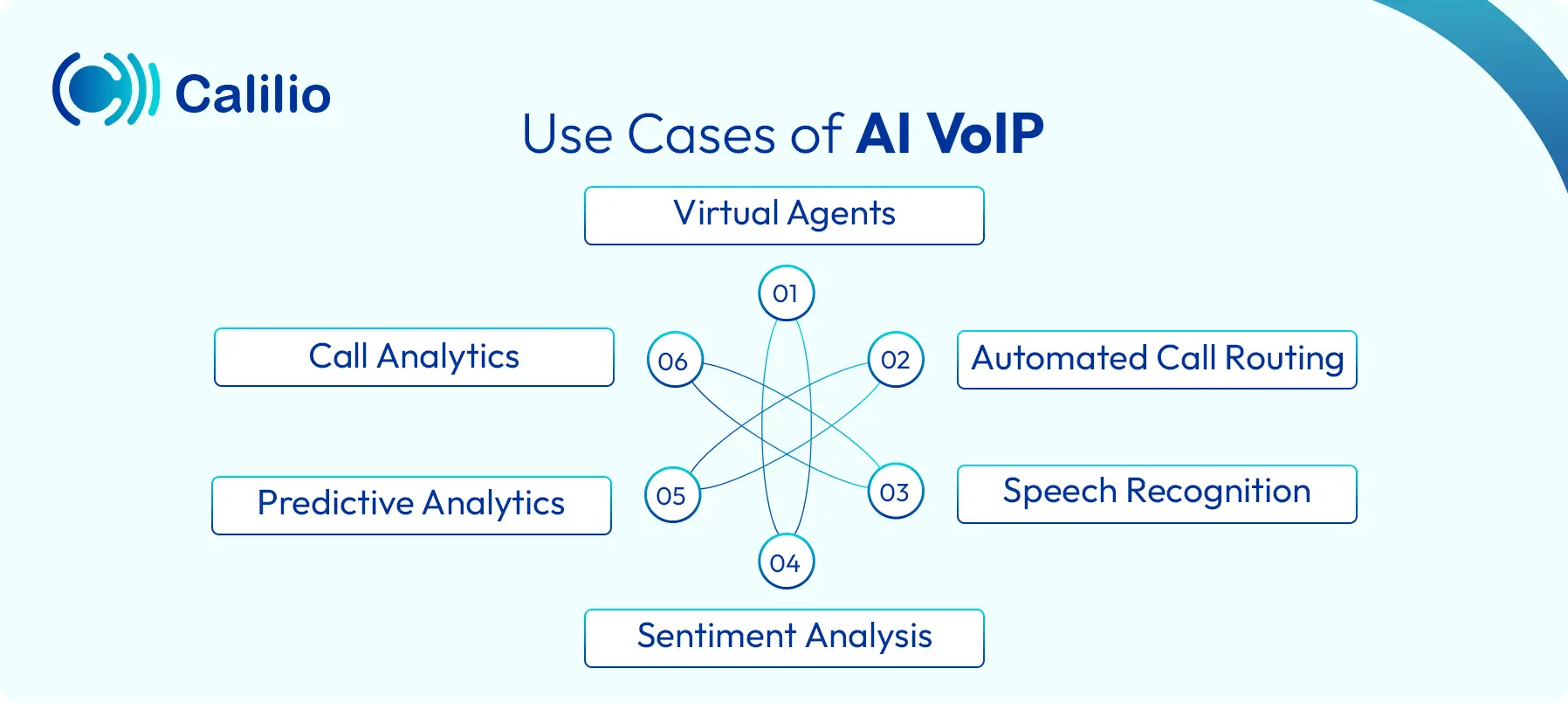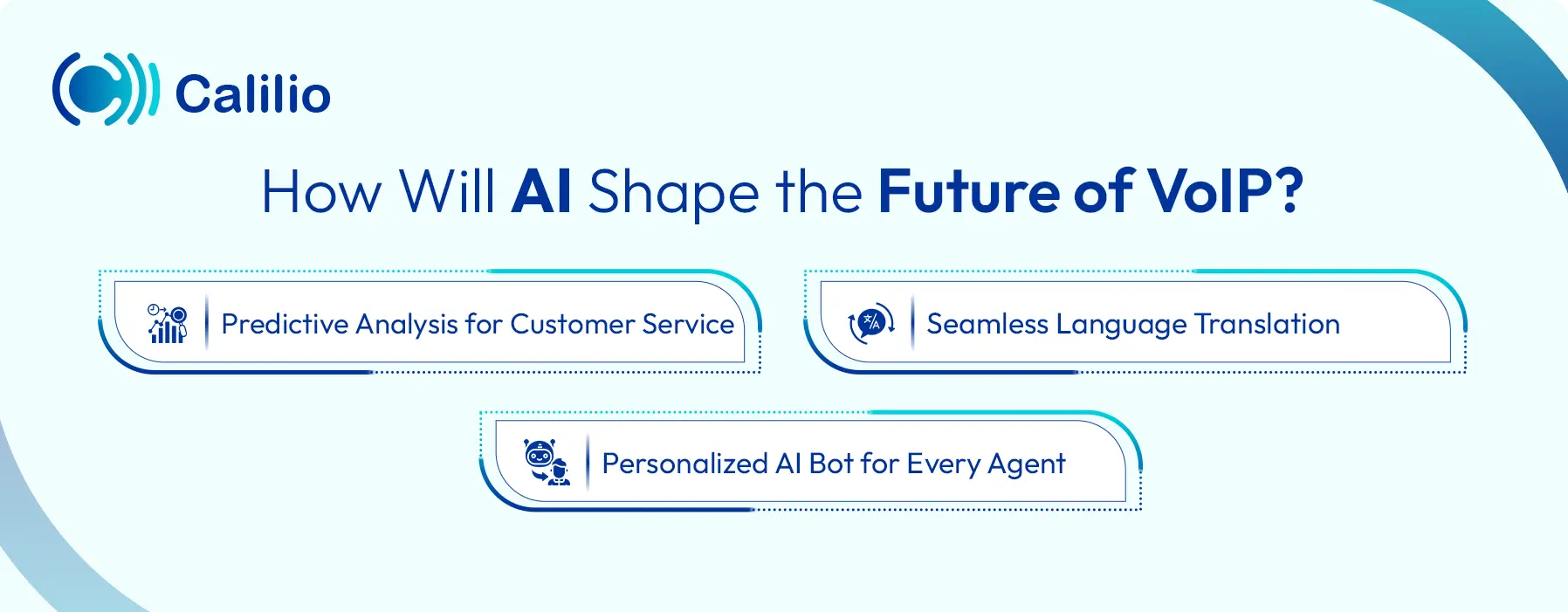AI VoIP: Transforming Business Communication with AI

VoIP has been helping businesses streamline communication for years, offering cost-effective voice calls over the internet. Despite its benefits, many businesses still face challenges like poor call quality, inefficient routing, and limited automation while using VoIP.
The simple solution to this is AI VoIP. It automates call routing, provides real-time insights, and enhances call quality to make communication smarter, clearer, and more efficient.
In this guide, we’ll explore what AI-powered VoIP is, how it works, alongside its benefits and applications in business communication. We’ll also look at how it compares with standard VoIP and discuss the future of AI in VoIP.
Keep reading!
Key Highlights:
AI VoIP is the integration of artificial intelligence into VoIP systems.
It offers benefits like better call quality, faster routing, 24/7 virtual assistants, and increased security with threat detection and voice biometrics.
Common use cases of AI-powered VoIP include virtual agents, automated call routing, real-time speech recognition, sentiment analysis, and predictive analytics.
The future of Artificial Intelligence in VoIP looks promising with real-time language translation, personalized AI assistants, and continuous improvements in automation and efficiency.
What Is AI VoIP?
AI VoIP (Voice over Internet Protocol) refers to the implementation of artificial intelligence technologies within VoIP systems to enhance their functionality.
This integration enables a VoIP system to understand and process voice interactions at a deeper level. They can interpret voice data, recognize speech patterns, and respond to input in intelligent ways. Essentially, it turns a simple communication tool into an intelligent communication system.
How Does AI VoIP Work?
AI in VoIP works by integrating artificial intelligence technologies into a VoIP phone system, utilizing Natural Language Processing (NLP) and machine learning to improve efficiency and automate tasks. By analyzing customer behaviour and voice data, AI provides real-time insights, identifies patterns, enhances call routing, and boosts VoIP functionalities.
1. Natural Language Processing (NLP)
AI uses automatic speech recognition (ASR) for real-time transcription and NLP for sentiment analysis, and to create automatic responses.
- Transcription: As you speak, the system captures your voice in real-time and converts it into text using speech-to-text technology.
- AI Sentiment Analysis: NLP then analyzes the transcribed text to understand the context, intent, and meaning of your words. This helps AI to adapt its response accordingly.
- Automate Response: Based on the analysis, AI can then take the actions, either answering questions, solving problems, or routing calls to the relevant department.
2. Machine Learning
While AI uses NLP to handle real time understanding of calls, it uses ML to learn from past data and improve continuously.
- Call Summary: ML helps automatically generate summaries of calls by identifying key points, decisions made, and customer concerns.
- Pattern Identification: By analyzing data of past conversations, ML identifies recurring issues. This insight helps businesses improve services and train AI to handle future queries better.
- Data Protection: ML can flag unusual behavior in calls, such as suspicious requests or identity verification. This helps protect sensitive information and prevent fraud.
Make Your Business Phone Smarter & Agents More Efficient!
Transform your business phone system with AI-driven VoIP. Get sentiment analysis, auto-transcription, and real-time call insights—all in one platform.
What Are The Benefits of AI in VoIP?
AI integration in VoIP helps to improve the call quality, strengthen security, and enhance user experience. It also allows for faster, more personalized responses and provides 24/7 availability, improving customer service.
1. Improve Call Quality
AI-Powered Jitter Control
The quality of a VoIP call is greatly impacted by latency and jitter, which occur when voice data packets arrive out of order or with inconsistent timing. The use of AI improves the call quality by predicting the flow of packets and reorganizing them in the correct sequence in real time. It helps adjust the buffer as needed to provide natural and stable voice transmission.
Noise Reduction
AI distinguishes between human voices and unwanted background sounds when speaking. It filters out non-human audio in real time, allowing only the speaker’s voice to pass through. This is especially helpful in remote work, customer support, or field-based environments where background noise is common.
Speech Clarity Enhancement
Using speech enhancement models, AI can clean up muffled or low-volume audio by amplifying voice signals and reducing distortion during VoIP calls. It makes voices sound clearer and more natural.
2. Provide Better User Experience
24/7 Availability
AI virtual assistants operate around the clock. This allows users to receive help and answers to their questions at any time, without having to wait for a human agent to become available. This saves users’ time, helping improve their experience with your business.
Automated Call Routing
AI analyzes incoming calls through IVR and directs them to the most appropriate agent based on the query’s complexity and the agent’s expertise. This technology enhances efficiency by reducing wait times and ensuring that customers are connected to the most relevant resources available.
Personalization
VoIP with AI can access the previous call records. This helps in making calls more personalized. For instance, by accessing the caller's history, an AI agent can address the caller by their name instead of just a greeting, giving a more personalized experience.
3. Enhanced Security
Real-Time Threat Detection
AI monitors call traffic and user behavior in real time to identify unusual patterns. Sudden call spikes, irregular call durations, or access from unknown locations could indicate fraud or security breaches. Artificial intelligence analyzes this data and notifies you before any damage occurs.
Voice Biometric Authentication
VoIP AI enhances security by using voice biometric authentication, which identifies users based on their unique voice patterns. This method ensures that only authorized individuals can access sensitive information or services. As such, it provides a higher level of protection against fraud and unauthorized access.
Data Encryption Management
AI continuously monitors encryption protocols and adapts them to address emerging security threats. This real-time management of encryption helps protect sensitive data during transmission, ensuring that conversations remain private and secure from potential eavesdropping or hacking attempts.
Use Cases of AI VoIP
AI transforms VoIP through virtual agents, intelligent call routing, speech recognition, sentiment analysis, call analytics, and predictive analytics.

1. Virtual Agents
AI-powered virtual agents handle customer inquiries, schedule appointments, and provide quick solutions without the need for human intervention. These assistants ensure prompt responses and a smoother customer experience.
2. Automated Call Routing
AI enables intelligent call routing by analyzing customer data through IVR and directing calls to the most appropriate agent or department. It helps to provide faster response times and reduce average wait times for customers.
3. Speech Recognition
AI-driven speech recognition in a VoIP phone system recognizes voice calls and voicemails and transcribes them in real time. This technology aids in automating tasks such as note-taking, call documentation, and search functions. Eventually, it helps improve productivity and accuracy.
4. Sentiment Analysis
AI can analyze the tone and sentiment of customer calls and help businesses understand customer emotions and satisfaction levels. Agents can tailor their responses based on customer sentiment to improve customer engagement and retention.
5. Predictive Analytics
AI uses historical data and machine learning algorithms to predict future customer behavior and trends. This allows businesses to proactively address issues, optimize resources, and enhance customer service strategies.
6. Call Analytics
AI-powered call analytics tracks key metrics such as call duration, frequency, and outcomes. By analyzing this data, businesses can gain insights into performance, identify improvement areas, and make data-driven decisions to optimize customer service.
AI VoIP vs Standard VoIP: Comparison
AI-enhanced VoIP leverages artificial intelligence to offer services like intelligent call routing, advanced analytics, and proactive call quality management. Traditional VoIP, on the other hand, relies on basic internet calling and may require manual intervention for tasks like call routing, analyzing data, and handling call inquiries.
Feature / Capability | Traditional VoIP | AI VoIP |
Call Routing | Manual or rule-based routing | AI-powered, context-aware, and dynamic routing |
Customer Interaction | Human agents | Virtual assistants + human agents for hybrid support |
Voice Recognition | Mostly supports Dual-Tone Multi-Frequency (DTMF) inputs | Advanced speech-to-text and natural language understanding |
Sentiment Analysis | Not available | Real-time emotion and tone detection |
Automation Level | Low | High – Automates FAQs, call triaging, follow-ups, etc. |
Scalability | Requires more agents as volume grows | Scales easily with minimal human intervention |
Learning and Adaptation | Static rules and scripts | Self-learning algorithms that improve over time |
Operational Cost | High as it depends on a large human workforce | Lower operational cost from reduced labor costs and increased efficiency |
Data Insights | Limited analytics | Rich insights from voice data, caller behavior, and call patterns |
Fraud Detection and Security | Basic encryption and user authentication | AI-driven anomaly detection and voice biometrics for enhanced security |
How Will AI Shape the Future of VoIP?
As AI continues to evolve, we’re witnessing many exciting features, such as real-time translation, that are transforming business communication. AI is shaping the future of VoIP by creating a telephony world where communication is not just smooth and efficient but also personalized, secure, and effortless.
As AI continues to evolve, we’re witnessing many exciting features, such as real-time translation, that are transforming business communication. AI is shaping the future of VoIP by creating a telephony world where communication is not just smooth and efficient but also personalized, secure, and effortless.
These advancements will improve how we connect, understand, and interact. Here are some exciting possibilities that will shape the future of VoIP:
1. Predictive Analysis for Customer Service
AI uses predictive analysis to study customer behavior, past interactions, and preferences. This allows businesses to actively route calls, offer solutions, and trigger automated responses, reshaping VoIP into a more responsive tool in the future.
2. Seamless Language Translation
AI-powered systems are continuously improving at translating conversations in real time with greater accuracy. The goal is to eliminate language barriers during customer interactions, enabling smooth, multilingual communication without misunderstandings.
3. Personalized AI Bot for Every Agent
Each human agent could have their own AI assistant to maximize efficiency. These bots will learn the agent’s strengths and working style, providing tailored support to improve performance.
Conclusion
AI VoIP is revolutionizing business communication. It offers businesses smarter, more efficient cloud telephony solutions that boost productivity, enhance security, and provide a more personalized customer experience. Moreover, it helps your business respond faster, reduce errors, and deliver exceptional service.
If you’re looking for an advanced VoIP solution with powerful AI integration, Calilio is the perfect choice. Our advanced AI-driven VoIP system is designed to streamline your business processes with powerful tools like AI sentiment analysis, call transcription, call summaries, and more.
Summarize this blog with:
Frequently Asked Questions
How does AI improve VoIP call quality?
AI improves call quality by reducing latency or jitter before it affects the call. It also cancels the background noise and reduces the echo disturbances to optimize call quality.
Can small businesses benefit from AI-powered VoIP?
How does AI handle incoming calls without human intervention?

Still have questions?
Can’t find the answer you’re looking for? Please chat with our friendly team.
Stay in the loop
Get the latest call insights, trends, and updates delivered straight to your inbox.
By subscribing, you agree to receive updates from Calilio.
You can unsubscribe anytime.
